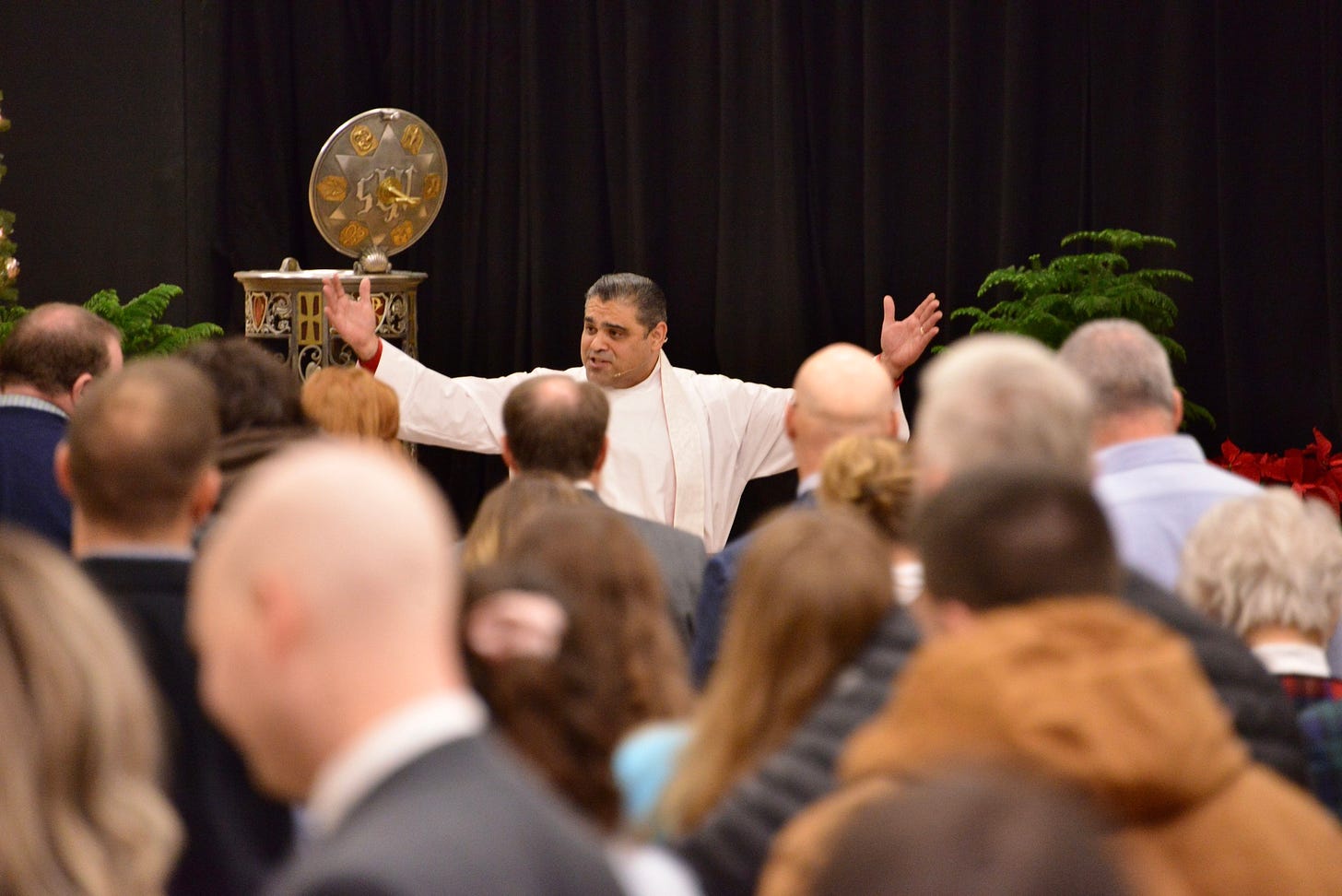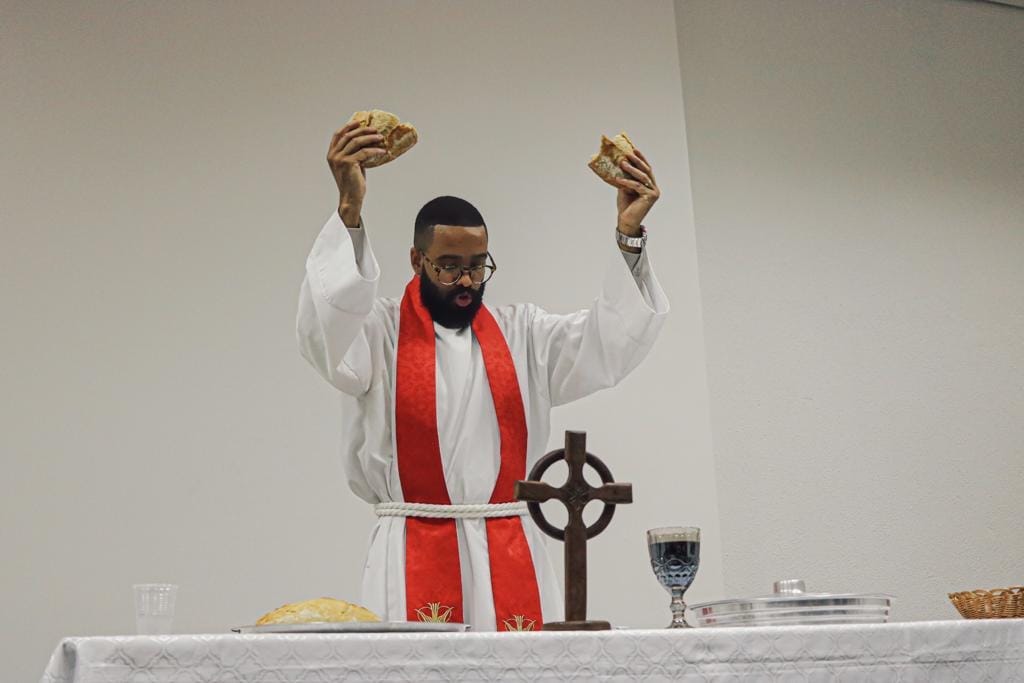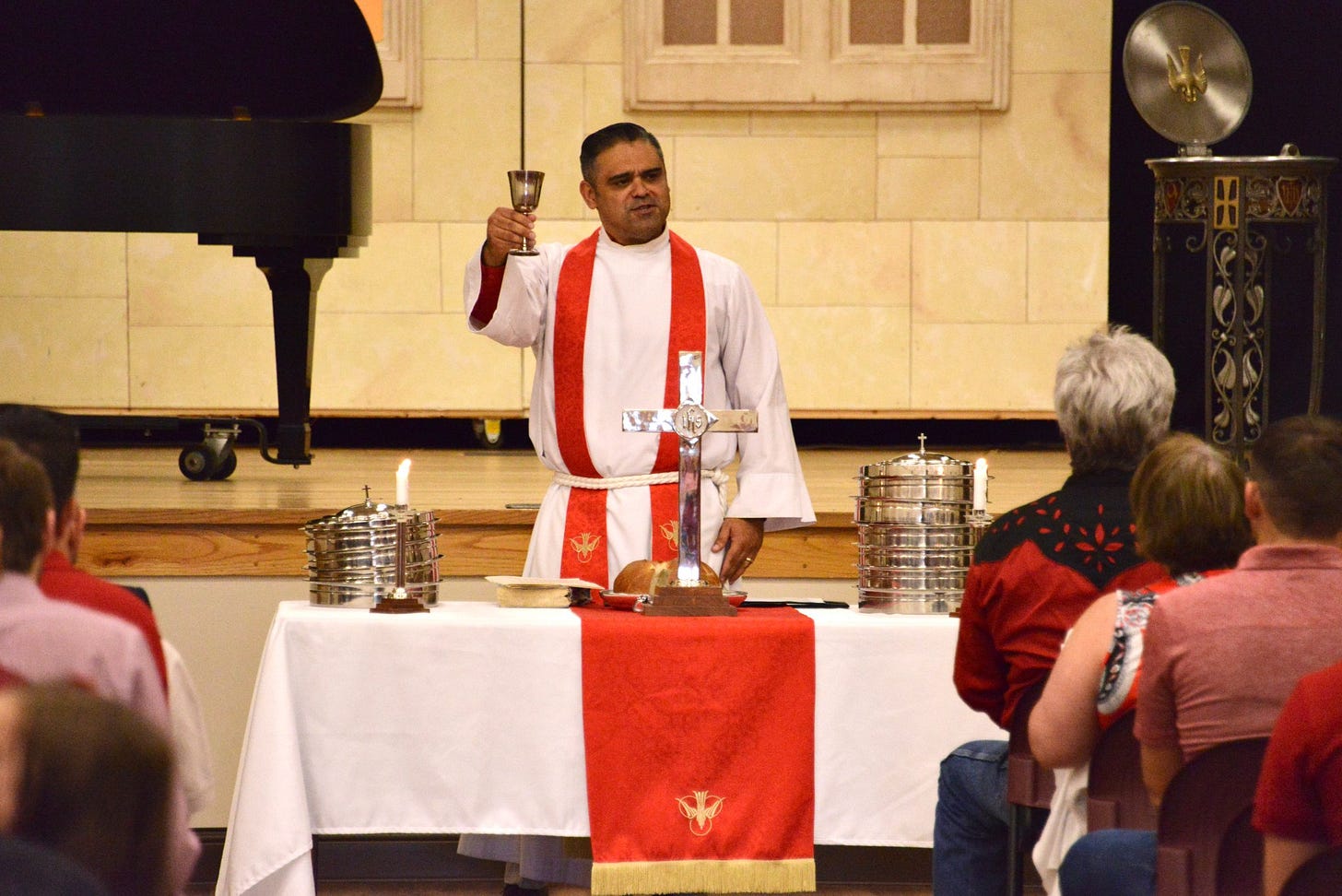The Case for Ordained Men Administering the Sacraments
Does the Bible support unordained men serving the Eucharist? Is there a confessional position on this matter? And why is this such a prevalent question in our day?
Thesis: I realize this essay will be quite provocative in an age of evangelical individualism, though as I show, my position is standard Reformed orthodoxy. What we are experiencing in our day is a return to basic ecclesiology. Yet, our fragmented world has provided the rationale for many men to form their own “churches” around their vision without hierarchical structures and accountability. They have become self-ordained priests living in a country with the highest number of Protestant churches in the world. Still, instead of submitting to other ordained men, they form their own eucharistic tables.
I am sure that the temptation for some reading this is to state some exception or another against my general principle stated below. While exceptions do exist, I am not interested in offering them in our present ecclesiastical situation where the ease of travel and education and institutional resources, and accreditation are easily achieved. The thesis I suggest is that the sacraments should be administered ordinarily by ordained men and should not be taken lightly by those who are not called to the Gospel ministry.
The Reformed Case
The Reformed tradition has definitively spoken on this issue through her many confessions and catechisms. The following serves as proof of this premise:
The Westminster Confession of Faith states in Chapter XXVII:
IV. There be only two sacraments ordained by Christ our Lord in the gospels, that is to say, Baptism and the Supper of the Lord: neither or which may be dispensed by any but a minister of the Word, lawfully ordained (italics mine).
The Anglican Communion’s 39 articles address this topic in this fashion in article 23, which speaks of “Ministering the Congregation:”
“It is not lawful for any man to take upon himself the office of public preaching or ministering the Sacraments in the congregation before he be lawfully called, and sent to execute the same.”
The Heidelberg Catechism addresses this topic in question #75:
“How art thou admonished and assured in the Lord's Supper, that thou art a partaker of that one sacrifice of Christ, accomplished on the cross, and of all his benefits?
Answer: Thus: That Christ has commanded me and all believers, to eat of this broken bread, and to drink of this cup, in remembrance of him, adding these promises: first, that his body was offered and broken on the cross for me, and his blood shed for me, as certainly as I see with my eyes, the bread of the Lord broken for me, and the cup communicated to me; and further, that he feeds and nourishes my soul to everlasting life, with his crucified body and shed blood, as assuredly as I receive from the hands of the minister, and taste with my mouth the bread and cup of the Lord, as certain signs of the body and blood of Christ.”
Finally, the Belgic Confession (Three Forms of Unity) speaks of the governance of the Church. Consequently, it addresses the issue of who may administer at the Lord’s Table in Article 30 concerning The Government of the Church:
“We believe that this true church ought to be governed according to the spiritual order that our Lord has taught us in his Word. There should be ministers or pastors to preach the Word of God and administer the sacraments. There should also be elders and deacons, along with the pastors, to make up the council of the church.
By this means true religion is preserved; true doctrine is able to take its course; and evil men are corrected spiritually and held in check, so that also the poor and all the afflicted may be helped and comforted according to their need. By this means everything will be done well and in good order in the church, when such persons are elected who are faithful and are chosen according to the rule that Paul gave to Timothy.”
In light of this overwhelming historical data, some object that this is merely a confessional view and that the Bible does not support this position. Since some may pose this objection, here are a few reasons deduced from the theology of the Bible, which affirms the confessional position.
The Biblical Case
First, Paul writes in I Corinthians 4 that the ministers “as servants of Christ” are also “stewards of the mysteries of God.” Paul elaborates these mysteries in Ephesians three as the bringing in of Gentiles into the promises of Jesus Christ and God's manifold wisdom to the world. The Church and her mysteries placed under the authority of the minister–-whose authority is granted by God (II Corinthians 13) — has a distinctly pastoral and ministerial supervision. Both Word and Sacrament are part of this ministry.
Second, Paul in I Corinthians 9 ties his apostolic authority to the authority granted in the Law of Moses. Thus, we can deduce that Paul’s authority as a New Covenant minister is parallel in function—though not in administration—to the Old Testament priesthood. In the Old Covenant, only the priests had sacramental authority. Thus, similarly, that authority not being rescinded remains with the ordained minister in the New Covenant.
Third, Paul in Ephesians 4:11-13 writes:
“And he gave the apostles, the prophets, the evangelists, the shepherds and teachers, to equip the saints for the work of ministry, for building up the body of Christ, until we all attain to the unity of the faith and of the knowledge of the Son of God, to mature manhood, to the measure of the stature of the fullness of Christ, so that we may no longer be children, tossed to and fro by the waves and carried about by every wind of doctrine, by human cunning, by craftiness in deceitful schemes.”
Is not the administration of the sacraments for the maturing of the saints, of the work of the ministry, of the edifying of the body of Christ? And to whom has Christ given that authority in the church to do these things? Pastors and teachers.
Fourth, though we affirm that the Church is a kingdom of priests (I Peter 2), yet, for the sake of good order, symbolism, the integrity of the church, and the well-being of her members, it is ordinarily best for the sacraments to be administered by a man who has been ordained and qualified for the gospel ministry. In the Old Covenant, Israel was a nation of priests but still had a special priesthood set apart within the nation to teach the people and lead their sacrificial/sacramental worship (cf. Ex. 19:6; Ex. 29).[1] As Rich Lusk writes:
While we are all priests in Christ, with the same holy status and access to God’s presence, there is a clear division of labor within the church’s priesthood. Paul’s pastoral epistles of 1-2 Timothy and Titus, along with the book of Acts, also prove the apostolic church continued to have a special pastoral/priestly office; the early Christians saw themselves as heirs of the polity of the Jewish church, albeit transformed, fulfilled, and renewed in Christ.[2]
The priesthood of all believers is not an excuse for theological privatization. Instead, as the Reformers elaborated, it is for the sake of service to one another and always subservient to the authorities God has placed in our lives.
Fifth, if the administration of the sacraments belongs to any Christian, then women should also be able to administer at the table in the absence of men (for instance, examples abound in churches in China, where mostly women and little children attend). There are no explicit commands forbidding women to administer at the table. Thus, the burden of proof is on those who believe unordained persons can administer at the table.
Sixth, John 10 places the under-shepherd of the sheep in charge of keeping the flock from going astray into false teaching. The under-shepherd is the guardian of truth. The sacraments are a means of grace for the people of God. The under-shepherd feeds and nourishes his own sheep, the flock given to him by God. The sacraments are nourishment for God’s people. In the Supper, the ordained minister teaches and administers the meal to those who abide in truth (John 8:31-33).
Similarly, Hebrews 13 says that members of the body are to “obey their leaders and submit to them for they are keeping watch over your souls, as those who will give account.” Leaders of the church are those who keep watch over the souls of their congregation. Again, following John 10, ministers are responsible for nurturing and feeding the flock.
Seventh, the gospels clearly state that the apostles have the authority to forgive the sins of any (John 20:21-23). Following St. James, Luther observed that we are to confess our sins to one another. Jeff Meyers argues that James is primarily a manual on pastoral labor in the Church, thus making James an application to pastors. But even if that is not the case, there is still a distinction between confessing sins to one another and forgiving any sins. This authority is not given to all. The power of the keys is given to those who proclaim the joys and judgment of God. Thus, the sacraments declare judgment for those outside the covenant and joy to those who partake.
Historically, Luther argued that there are legitimate situations in which Christians can baptize one another depending on the circumstances, but interestingly, Luther never—neither did the other Reformers—suggested that the Lord’s Supper could be administered by lay people.
Eighth, the question should be asked: “What is the biblical case for laypeople administering at the Lord’s Table?” Once that question is answered, what does the overwhelming data of the Scriptures suggest? We cannot be neutral on this issue. What does the wisdom of the Bible dictate? As G.I. Williamson writes, “There is no evidence in Scripture to show that other than church officers ever administered the sacraments in the apostolic church.”[3]
Conclusion
Peter Leithart observes that "the Body is not without order; again, the kingdom of God is not a Rousseauain paradise...in all properly functioning churches of Christ someone is designated as guardian of the Table (Blessed are the Hungry)." Reformational sacramental theology restored decency and order to the worship renewal.
If the sacraments are what the Reformation says they are, they are more than mere signs of a past event, but rather the sign and seal of what God promises us and our children. Since this is the case, they are not to be treated lightly. Laymen in the church assume their proper role as authorities in the home, which enables them to enact justice as they see fit under the authority of God. Yet, they are not called nor qualified to administer the table to the family of God.
Distinctions in spheres cannot be set aside. The Church is the household of faith, an everlasting empire. In this new kingdom, the Church swallows the biological family and creates a new society of shepherds to guide and direct the flock how she should go.
[1] Thanks to Rich Lusk for these insights.
[2] Lusk, Who may celebrate the Eucharist at TPC.
[3] The Westminster Confession of Faith for Study Classes; G.I. Williamson.





This is such valuable teaching in our society today where authority is mocked and individualism and progressivism are the preeminent gods of the age. As an Anglican, I agree with everything you have set forth here: the incredibly important need for orderly worship and Sacraments celebrated by men called by God and the Church. I also appreciate your emphasis on the laymen of the church acting as the pastors and overseers of their own homes to ensure that their families are learning the Word of God and receiving a godly example for walking with God.
I think there is a common misconception among poorly formed Christians today that the ecclesiological order of the church is simply for exercising power over people and benefiting from the money and obedience of the congregation. Sadly, this has been the reality for many who have experienced spiritual abuse from spiritual leaders that they trusted and admired. However, when we examine the Scriptures, we see that God's design for the ecclesiological order of his Church is for the spiritual leadership--the ordained men of God--to represent Christ to his Church. To live in such a way that they represent Christ by communicating the love and faithfulness of Christ to the congregation.
This is a unique responsibility for ordained men who have been set apart for the sacred role of ministering within the congregation to preach the saving message of Christ in Word and Sacrament. As an Anglican, I also appreciate the role of the episcopacy for overseeing this responsibility. They represent Christ to the Church and ensure that the presbyters and deacons that they ordain fulfill the respective responsibilities that they have received.
Rich and insightful. My husband and I recognized that the sacraments were not properly being administered in our previous church home. Due to this we abstained. These reasons along with many others, reinforced our decision to leave. We are grateful and comforted to know that they are at Grace Covenant. We partake joyfully each week
Thank you for these words. . Grace be to you.